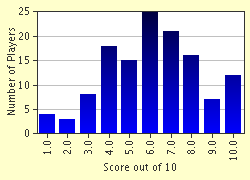Quiz Answer Key and Fun Facts
1. "I heard the cheerful clatter of his cans as he went round with the milk of human kindness." A British historian and biographer said this in 1920 about whom?
2. "He has plenty of music in him, but he cannot get it out." Was said by whom about Robert Browning?
3. "He had not the intellectual equipment of a supreme modern poet; except for his genius he was an ordinary nineteenth century gentleman, with little culture and no ideas." British poet and critic, Matthew Arnold, wrote this in 1865 about whom?
4. Van Wyck Brooks, a US critic, once said, "He is to poetry what the barrel-organ is to music." Which poet was he talking about?
5. The young Henry James once described her as "magnificently, awe-inspiringly ugly." Who was she?
6. When US writer Max Eastman asked, why his book was written in such a difficult style, who replied, "To keep the critics busy for three hundred years."?
7. Of whom was it once said, "He would not blow his nose without moralising on conditions in the handkerchief industry."?
8. Henry James said of which US essayist and poet, "He was imperfect, unfinished, inartistic; he was worse than provincial - he was parochial."?
9. "People who can do these things must be dead to all senses of shame, and one cannot hope to produce any effect upon them." This was said about which famous poet and dramatist?
10. John Dunlop, a British writer said of whose writing, "Evidence of a diseased mind and a lacerated heart."?
Source: Author
Engadine
This quiz was reviewed by FunTrivia editor
thejazzkickazz before going online.
Any errors found in FunTrivia content are routinely corrected through our feedback system.

